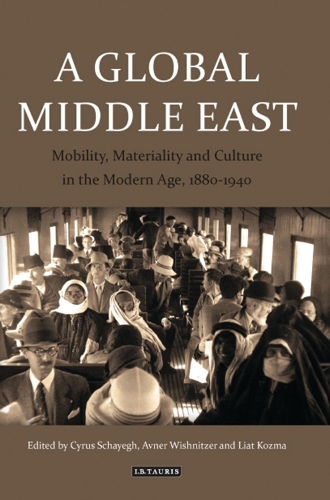
A Global Middle East: Mobility, Materiality and Culture in the Modern Age, 1880-1940(Library of Middle East History)
Series: Library of Middle East History
The start of the twentieth century ushered in a period of unprecedented change in the Middle East. These transformations, brought about by the emergence of the modern state system and an increasing interaction with a more globalized economy, irrevocably altered the political and social structures of the Middle East, even as the region itself left its mark on the processes of globalization themselv
NaN
VOLUME
English
Hardback

The start of the twentieth century ushered in a period of unprecedented change in the Middle East. These transformations, brought about by the emergence of the modern state system and an increasing interaction with a more globalized economy, irrevocably altered the political and social structures of the Middle East, even as the region itself left its mark on the processes of globalization themselves. As a result of these changes, there was an intensification in the movement of people, commodities and ideas across the globe: commercial activity, urban space, intellectual life, leisure culture, immigration patterns and education - nothing was left untouched. It shows how even as the Middle East was responding to increased economic interactions with the rest of the world by restructuring not only local economies, but also cultural, political and social institutions, the region's engagement with these trends altered the nature of globalization itself. This period has been seen as one in which the modern state system and its oftentimes artificial boundaries emerged in the Middle East. But this book highlights how, despite this, it was also one of tremendous interconnection.Approaching the first period of modern globalization by investigating the movement of people, objects and ideas into, around and out of the Middle East, the authors demonstrate how the Middle East in this period was not simply subject or reactive to the West, but rather an active participant in the transnational flows that transformed both the region and the world. A Global Middle East offers an examination of a variety of intellectual and more material exchanges, such as nascent feminist movements and Islamist ideologies as well as the movement of sex workers across the Mediterranean and Jewish migration into Palestine. A Global Middle East emphasises this by examining the multi-directional nature of movement across borders, as well as this movement's intensity, volume and speed. By focusing on the theme of mobility as the defining feature of 'modern globalization' in the Middle East, it provides an essential examination of the formative years of the region.Table of Contents: List of Illustrations • Acknowledgements • List of Contributors Introduction Liat Kozma, Cyrus Schayegh and Avner Wishnitzer Part 1 Global networks, local networking Chapter 1 On scales and spaces: Reading Gottlieb Schumacher’s The Jaulân (1888) (Cyrus Schayegh) Chapter 2 The Emir and the sea: The rise and fall of ‘Abdullahi Muhammad b. Ali Abdaššakur, Harär’s last emir (1885-1887) (Avishai Ben-Dror) Part 2 People on the move Chapter 3 Education and mobility: Universities in Cairo between competition and standardisation 1900-1950 (Valeska Huber) Chapter 4 International migration and sex work in early twentieth-century Cairo (Francesca Biancani) Chapter 5 Jews on the move during the late Ottoman period: Trends and some problems (Yaron Ben-Naeh) Part 3 A short piece Chapter 6 Global migration into late Ottoman Jaffa as reflected in the Arab-Palestinian newspaper Filastin (1911-1913) (Evelin Dierauff) Part 4 Objects and related practices on the move Chapter 7 Papers for going, papers for staying: Identification and subject formation in the Eastern Mediterranean (Will Hanley) Chapter 8 Travelling substances and their human carriers: Hashish-trafficking in Mandatory Palestine (Haggai Ram) Chapter 9 On the diffusion of ‘small’ western technologies and consumer goods in the Middle East during the era of the first modern globalization (Uri M. Kupferschmidt) Part 5 A short piece Chapter 10 Bees on camels: Technologies of movement in late Ottoman Palestine (Tamar Novick) Part 6 Ideas on the move Chapter 11 Re-imagining Islam in the period of the first modern globalization: Muhammad ‘Abduh and his Theology of Unity (Johann Buessow) Chapter 12 New practices: Arab printing, publishing and mass reading (Ami Ayalon) Part 7 Short pieces Chapter 13 The movement of feminist ideas: The case of Kadinlar Dünyas (Elife Biçer-Deveci) Chapter 14 Religion in motion and the essence of Islam: Manifestations of the global in Muhammad ‘Abduh’s response to Farah Antun (Joachim Langner) Index
Price Comparison [India]
In This Series
Bestseller Manga
Trending NEWS




















